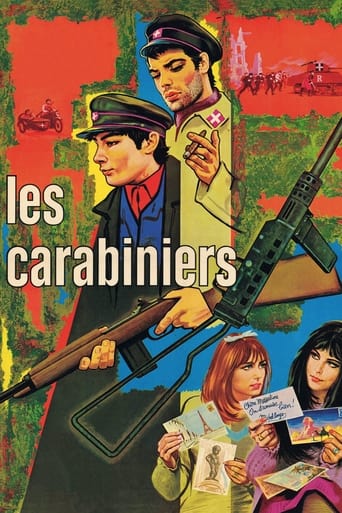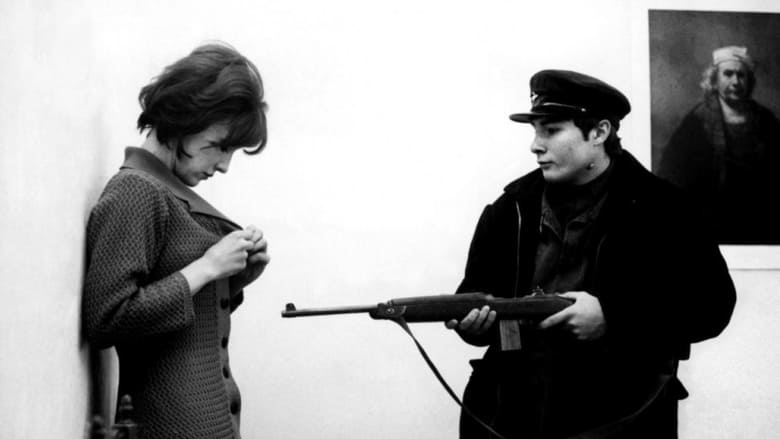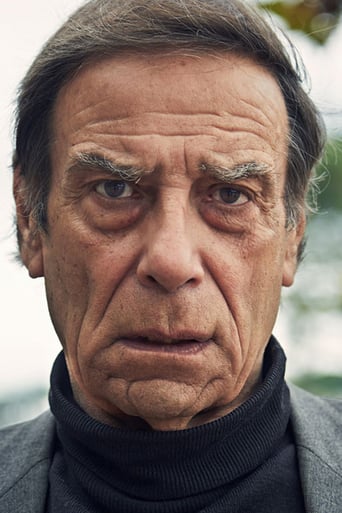The Carabineers (1963)
During a war in an imaginary country, unscrupulous soldiers recruit poor farmers with promises of an easy and happy life. Two of these farmers write to their wives of their exploits.
Watch Trailer
Free Trial Channels
Cast


Reviews
The greatest movie ever made..!
This film is so real. It treats its characters with so much care and sensitivity.
It is an exhilarating, distressing, funny and profound film, with one of the more memorable film scores in years,
There's a more than satisfactory amount of boom-boom in the movie's trim running time.
One of Godard's better films from the 60's, which like a number of his films from his prime era is usually either liked a lot or detested to hell, is almost audience-dividing on purpose. His film is a black comedy that sometimes is (successfully) deceptively a bleak drama of corruption of the working man in times of War. Stylistically it is Godard all the way, though one can't disregard the likely significant contributions (though it may be hard to detect since it IS Godard's mouth all over the pie so to speak) of screenwriters Jean Gurault (usually Truffaut's co-writer), and (apparently) Roberto Rossellini. Rossellini, who was one of Godard's big influences, is countered by what was also a big influence likely on this picture, Samuel Fuller, the king of B War pictures. So one could look at the quasi-split of ideals in the film, of Rossellini's documentary style of telling it like it is, crossed with Fuller's hard professionalism and no-holds- barred view of War. Whomever influence comes through stronger, this is really Godard's show, and has here something that is fairly usual in terms of his challenging styles and criticizing past films (including Truffaut with his own comments on War depicted in film), but also is unique for how it is presented, and makes it a difficult, though rewarding experience. This is the French new-wave equivalent, to put it another way, to Sam Mendes's Jarhead; you're not sure if this really should be classified as a typical 'war' film, despite being in a league of other films already in place.One thing that is as fascinating as it is occasionally frustrating is Godard's main male actors, Albert Muross and Marino Mase, are not very expressive, and of course are not really 'actors' in the traditional sense (at least at the time they were close to un- professionals). But maybe that is what's needed, dumb farm boys who are propogandized into going to fight for their invading, nameless country; the opening scenes of the list of things the men will get is equally funny and troubling. Then the boys go off to war, and there is a really astute episodic kind of storytelling used, which works considering the short time length. One scene that really stood out was when one of the soldiers goes to see his first film ever, and is almost like some kind of primate seeing a woman disrobing on a screen (it's also arguably the funniest scene in the film). When the boys come home they are loaded with pictures, in a scene that is the one that almost had me questioning if it was either really good or really too long; the length of the list of pictures is like a litmus test for moviegoers- can you take all of these images, done almost to make a point that's not too clear? But what makes Les Carabiniers work for me is how it is so un-like other war films that it stands alone on its own terms, like a French new-wave Dr. Strangelove (though maybe not a masterpiece like that one). At times I wasn't totally sure where the satire started or ended, and there is a certain distance that Godard places with his many long-shots getting in as much landscape as tanks and soldiers with their guns. What's surprising is how the tone is always assured, which is crucial considering this is a story told through the side of the invaders this time, men working under their elusive King for land and riches and wealth. One of the best scenes I may have seen in any Godard film is when they have a woman who is at first thought to be 'a friend' of the soldiers, but then goes off on a Leninist rant. The men are about to shoot her, but can't for a few minutes, as the words she says strike some kind of chord in their primal mindsets. Amid montages of archive footage of planes flying and bombs dropping, there's a scene that would never ever be in any 'conventional' war picture. There's a real thought process going on here, and even if it's got some of Godard's usual 'f*** you, it's my style, take it or leave it' attitude, it's not totally un-accessible either. It's a slim volume of gritty anti-War pathos, and it's maybe a tad under-rated in the director's massive catalog.
As countrymen fight amongst themselves, two farmers join the fight for riches and fame, writing home to their wives with their view of the battle. Godard used actual letters from soldiers in various wars as a backdrop.The film was originally panned as the worst film ever made. So much so that Godard pulled the film from all distribution. Amusingly thought provoking.The best scenes in the film come during their fighting for "the king". Unknown enemy, speaking the same language and wearing the same uniforms, Godard successfully blurs the lines of war and reason.
Godard is considered on of the best directors ever and this is a good example why. The illogical stupidity of war is well reflected in a very illogical screenplay. The director made a deep reflection of things around the war. Stupid arguments to join the army like everything is permitted: to ripe, to steal, to kill innocents, to have a lot of richness, to visit different countries, to have immunity because a letter from the king. Then when the men of the house were convinced to join the king's army started a very interesting sequences where they are describing brutalities of the combats with an apparently cold blood. Actually we can see the handwriting on screen: "We shoot the rebels on the head, we bury them in a common hole, when is full just put some soil on the top". The movie continues in a series of sequences between the two male main characters (Michel Angelo and Ulyses, performed by Albert Juross and Marino Mase, respectively) and the two females at home (Catherine Ribeiro and Genieveve Galea, Cleopatre and Venus). The contact between them is the letters and postcards, where they described a lot of war insanities.A good sequence occurs when Michel Angelo meets the movies for the first time. He is almost in the front and he reacts with the events in the screen: he feels terrified when the train is arriving to the station and he wanted to "see more" when the young lady is taking a shower. The end is probably the most coherent result of the incoherences showed. The two guys returned home with nothing but postcards as the only richness they obtained and cruel dead at the hands of the men (the rifle men) who recruited them in the first place. At the end war, is so absurd that only absurd things could result of it.This film was written by Jean-Luc Godard with Roberto Rosellini, based in the homonym play by Beniammino Joppolo. In the natural way of Godard's early films, his technique is full of direct cuts and against Hollywood standards: the camera follows the action and there is no real sequence between the shots. Anyhow the result is superb. If you like different proposals with lot of criticism and situations to make you think and you are against the war and stupidity you will like this movie, if not, well make your conclusions.
That this movie got a 6.8 on the IMDB rating scale astounds me. That its audiences were expected to pay to see it and that it was thought worthy of being re-issued on dvd astounds me. Whatever points it was trying to make got lost in the what I found to be the ugliness of the film-making. Jean-Luc Godard, je vous accuse.








